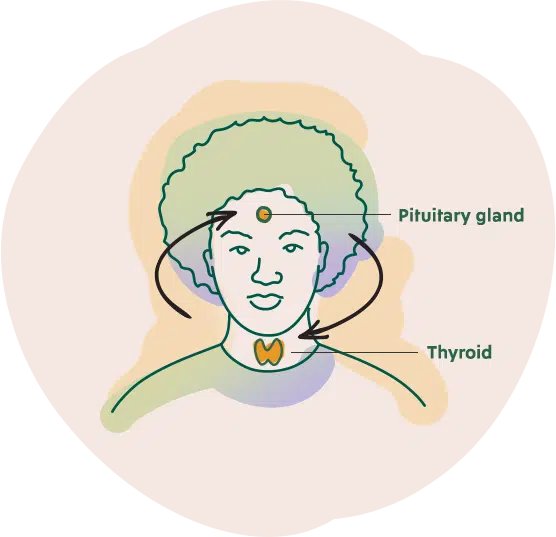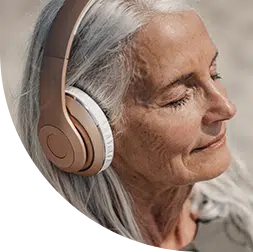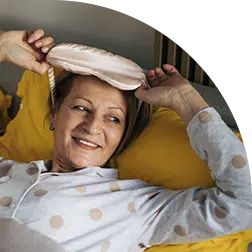
I'm back!
To feeling more like myself.
To feeling more like myself.
ACTOR PORTRAYALUnderstanding More About Hypothyroidism
Hypothyroidism, also known as underactive thyroid, is a condition that results when your thyroid gland does not produce enough hormones.1,2 Those hormones include levothyroxine (T4 ) and liothyronine (T3), which help regulate your weight, energy level, mood, and other bodily functions.3,4 Hypothyroidism affects an estimated 10 million Americans and is 5-10 times more common in women than men.
Signs and Symptoms
When your thyroid hormones are unbalanced, symptoms related to thyroid conditions can occur. The most common symptoms of hypothyroidism are feeling tired (fatigue) and feeling cold.5
Common Symptoms of Hypothyroidism1,5,6
-
Hair loss
-
Brain fog (forgetfulness)
-
Difficulty concentrating
-
Slow speech
-
Dry skin
-
Constipation
-
Heavy or irregular menstrual periods
-
Weight gain

How Your Thyroid Works—Or Doesn’t Work
Your thyroid gland is a small butterfly-shaped organ located at the base of your neck. The thyroid creates hormones that control the speed of your metabolism, as well as how the body regulates body temperature and heart rate.7 T4 is the main type of thyroid hormone produced by the thyroid gland. However, T3 is the active form of thyroid hormone that impacts your cells.7 Most T3 is produced by the body converting T4 to T3.7
The pituitary gland, which is located in your brain, keeps checking the thyroid hormone levels in your body to make sure there isn’t too much—or too little.6
In hypothyroidism, either the thyroid gland or the pituitary gland is not working in a way to create the proper thyroid hormone balance for your body.5 10% to 15% of people still have hypothyroidism symptoms despite treatment with T4 alone.8 ADTHYZA® can supplement the T4 and T3 produced by the thyroid, and may be an option for patients still experiencing persistent symptoms.9
LEARN MORE ABOUT ADTHYZATips for Day-To-Day Living with Hypothyroidism
Hypothyroidism can be a lifelong journey. When you experience symptoms such as fatigue, brain fog, and weight gain, some days may feel like an uphill battle. Finding the right medication is a vital step in managing hypothyroidism. A healthy lifestyle including a balanced approach to nutrition, exercise, and self-care can help you to enhance your well-being and feel more energized and happy.
-
Exercise
Exercise may help you manage your hypothyroidism symptoms, and provides additional benefits such as improved mood, increased strength, and reduced risk of many other diseases.10,11 Find a consistent routine that works for you, whether that involves taking daily walks, strength training, or anything else that keeps you motivated. A personal trainer or coach may help you reach your exercise and weight goals.
-
Restful Sleep
Thyroid issues can mean your body chemistry is out of balance which can affect your sleep.12 Some tips to help you get a better night’s rest:
- Find a comfortable sleeping temperature
- Set a bedtime routine that includes relaxing activities, like reading or taking a bath
- Turn off electronic devices at least an hour before bed
- Limit alcohol and caffeine, and avoid heavy meals close to bedtime
-
Self-Care
Self-care means different things to different people. Some people find themselves most relaxed while doing gentle yoga, stretching, or meditating. Others may prefer to listen to music or drink tea. One of the underlying reasons for self-care is to limit or manage stress.13 Step away from stressful triggers and spend time doing an activity that makes you feel good.
-
Nutrition
Eating a balanced diet is important. There may be a correlation between hypothyroidism and certain food sensitivities, such as gluten and soy, but generally there is no specific diet recommended for people with hypothyroidism.14,15
ACTOR PORTRAYAL
Stay Connected Through Email
Sign up to receive information and resources on hypothyroidism and ADTHYZA, which may help you take control of your symptoms.

Please note that Adthyza® has not been reviewed by the FDA for safety or efficacy.
WARNING
DRUGS WITH THYROID HORMONE ACTIVITY, ALONE OR TOGETHER WITH OTHER THERAPEUTIC AGENTS, HAVE BEEN USED FOR THE TREATMENT OF OBESITY. IN EUTHYROID PATIENTS, DOSES WITHIN THE RANGE OF DAILY HORMONAL REQUIREMENTS ARE INEFFECTIVE FOR WEIGHT REDUCTION. LARGER DOSES MAY PRODUCE SERIOUS OR EVEN LIFE-THREATENING MANIFESTATIONS OF TOXICITY, PARTICULARLY WHEN GIVEN IN ASSOCIATION WITH SYMPATHOMIMETIC AMINES SUCH AS THOSE USED FOR THEIR ANORECTIC EFFECTS.
INDICATIONS:
ADTHYZA® (thyroid tablets, USP) is a prescription medicine indicated as replacement or supplemental therapy in patients with hypothyroidism of any etiology, except transient hypothyroidism during the recovery phase of subacute thyroiditis.
ADTHYZA® is also indicated as a pituitary TSH suppressant in the treatment or prevention of various types of euthyroid goiters, including thyroid nodules, subacute or chronic lymphocytic thyroiditis (Hashimoto’s), multinodular goiter, and in the management of thyroid cancer.
IMPORTANT SAFETY INFORMATION
Do not use ADTHYZA in patients with uncorrected adrenal cortical insufficiency, untreated thyrotoxicosis (high thyroid hormone levels), and apparent hypersensitivity to any component of the product.
The use of thyroid hormones for weight loss, alone or combined with other drugs, is unjustified and has been shown to be ineffective. Neither is their use justified for the treatment of male or female infertility unless this condition is accompanied by low thyroid levels.
Thyroid hormones should be used with great caution in circumstances where the integrity of the cardiovascular system is suspected. In the elderly and in patients with cardiovascular disease, ADTHYZA should be used with greater caution.
Tell your doctor about any other medical conditions you may have, especially heart disease, diabetes, blood clotting problems, and adrenal or pituitary gland problems. The dose of other drugs you may be taking to control these conditions may have to be changed while you are taking.
A reportedly apparent association between prolonged thyroid therapy and breast cancer has not been confirmed, and patients on thyroid for established indications should not discontinue therapy. No confirmatory long-term studies in animals have been performed to evaluate cancer causing potential, mutagenicity, or impairment of fertility in either males or females.
Thyroid replacement therapy for hypothyroid women should not be discontinued during pregnancy, and hypothyroidism diagnosed during pregnancy should be promptly treated. Minimal amounts of thyroid hormones are excreted in human milk. However, caution should be exercised when thyroid is administered to a nursing woman. Routine determinations of serum T4 and/or TSH are strongly advised in neonates in view of the deleterious effects of thyroid deficiency on growth and development.
Tell your doctor immediately if you experience chest pain, increased pulse rate, rapid, strong, irregular heartbeat, excessive sweating, or any other unusual event.
Partial loss of hair may be experienced by children in the first few months of thyroid therapy, but this is usually a transient phenomenon.
Many drugs and some laboratory tests may alter your therapeutic response to ADTHYZA.
Tell your doctor about all medicines you take, including prescription and nonprescription medicines, vitamins, and herbal supplements. Especially tell your doctor if you take medicines to treat and prevent blood clots (anticoagulants), antidiabetic agents, or oral contraceptives.
For further information, please see the accompanying complete Prescribing Information for ADTHYZA.
To report SUSPECTED ADVERSE REACTIONS, contact Azurity Pharmaceuticals, Inc. at 1-800-461-7449 or the FDA at www.fda.gov/medwatch or call 1-800-FDA-1088.
References
- 1. Norman J. What is hypothyroidism? EndocrineWeb. Published December 9, 2021. Accessed October 23, 2023. https://www.endocrineweb.com/conditions/hypothyroidism What is hypothyroidism?
- 2. Levothyroxine. MedlinePlus. Accessed October 23, 2023. https://medlineplus.gov/druginfo/meds/a682461.html Levothyroxine. MedlinePlus
- 3. Hypothyroidism: Hashimoto’s disease. MedlinePlus. Published October 27, 2021. Accessed October 23, 2023. https://medlineplus.gov/hypothyroidism.html Hypothyroidism
- 4. Shahid MA, Ashraf MA, Sharma S. Physiology, thyroid hormone. In: StatPearls [Internet]. StatPearls Publishing; 2021. Updated May 12, 2021. https://www.ncbi.nlm.nih.gov/books/NBK500006/ Thyroid Hormone
- 5. Gaitonde DY, Rowley KD, Sweeney LB. Hypothyroidism: an update. Am Fam Physician. 2012;86(3):244-251.
- 6. Hypothyroidism. Cleveland Clinic. Updated April 19, 2020. Accessed October 23, 2023.
https://my.clevelandclinic.org/health/diseases/12120-hypothyroidism Hypothyroidism - 7. Thyroid hormone. Cleveland Clinic. Updated February 15, 2022. Accessed October 23, 2023. https://my.clevelandclinic.org/health/articles/22391-thyroid-hormone Thyroid hormone
- 8. McAninch EA, Bianco AC. The swinging pendulum in treatment for hypothyroidism: from (and toward?) combination therapy. Front Endocrinol. 2019;10:446. doi:10.3389/fendo.2019.00446
- 9. Adthyza [prescribing information] Woburn, MA, Azurity Pharmaceuticals, Inc. 2023 https://adthyza.com/hcp/media/pdf/Adthyza_PI.pdf Prescribing Information
- 10. Madhusoodanan J. Hypothyroidism Exercise Plan. Healthline. Updated on August 16, 2019. Accessed October 23, 2023. https://www.healthline.com/health/hypothyroidism/exercise-plan Hypothyroidism Exercise Plan
- 11. Benefits of exercise. MedlinePlus. Updated August 30, 2017. Accessed October 23, 2023. https://medlineplus.gov/benefitsofexercise.html Benefits of exercise
- 12. Green ME Et. Al. Thyroid Dysfunction and Sleep Disorders. Front Endocrinol (Lausanne). 2021; 12: 725829 Publishhed online 2021 Aug 24. Doi: 19.3389/fendo.2021.725829
- 13. National Institute of Mental Health. Caring for Your Mental Health. https://www.nimh.nih.gov/health/topics/caring-for-your-mental-health National Institute of Mental Health
- 14. Lerner A, Jeremias P, Matthias T. Gut-thyroid axis and celiac disease. Endocr Connect. 2017;6(4):R52-R58. doi:10.1530/EC-17-0021
- 15. Mayo Clinic Q and A: hypothyroidism and dietary challenges. Mayo Clinic News Network. Published September 14, 2020. Accessed October 23, 2023. https://newsnetwork.mayoclinic.org/discussion/mayo-clinic-q-and-a-hypothyroidism-and-dietary-challenges/ Mayo Clinic Q and A: hypothyroidism and dietary challenges









